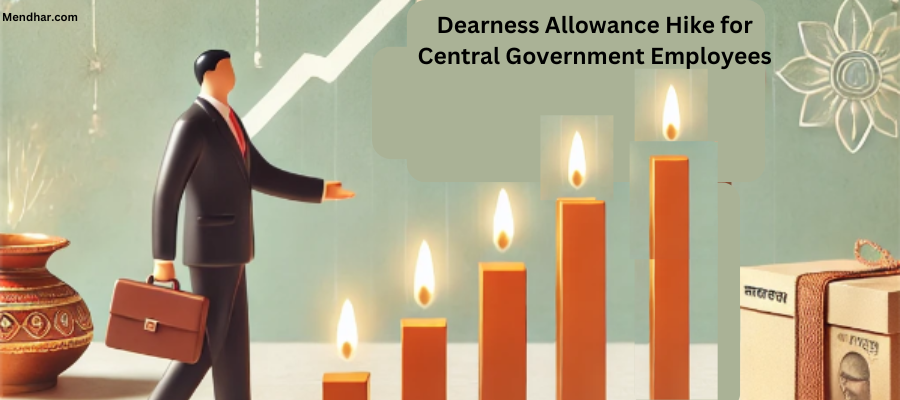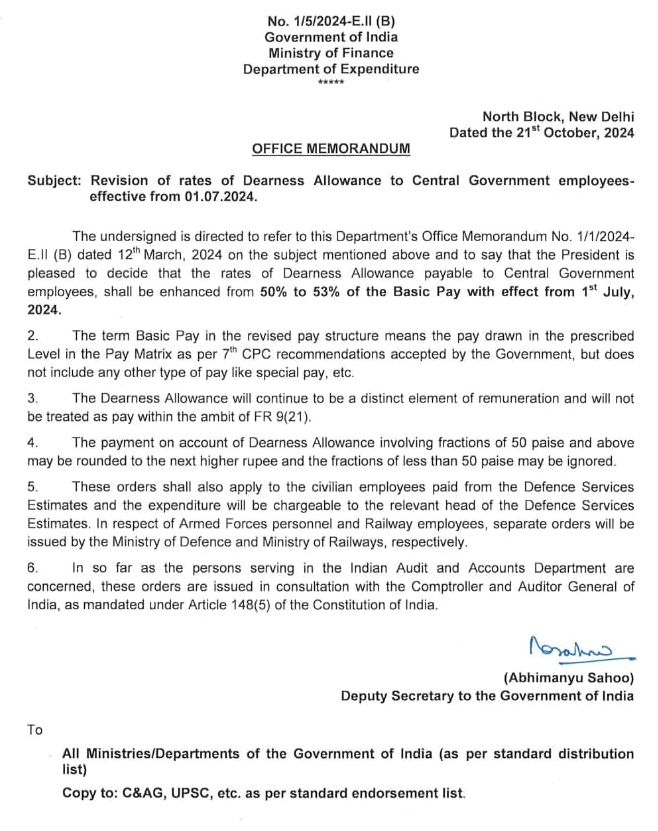Table of Contents
ToggleDearness Allowance Hike for Central Government Employees: 2024 Revision

The Dearness Allowance hike for Central Government employees has officially been announced by the Ministry of Finance, effective from July 1, 2024. As per the Office Memorandum No. 1/5/2024-E.II (B), dated October 21, 2024, the Dearness Allowance (DA) has been increased from 50% to 53% of Basic Pay. This 3% hike is a much-needed relief for government employees, helping them counter inflation and the rising cost of living. The Dearness Allowance hike for Central Government employees applies to civilian employees, with separate orders for Armed Forces personnel and Railway employees to be issued by their respective ministries. Let’s dive into the details of this revision and understand its impact.
Key Details of the Dearness Allowance Hike
The Dearness Allowance hike for Central Government employees applies to all employees working under the 7th Pay Commission framework. The term Basic Pay refers to the salary drawn by employees in their respective pay levels in the Pay Matrix. It is important to note that special pay or any other allowances are excluded from the Basic Pay for the calculation of DA. The 3% increase in Dearness Allowance for Central Government employees is aimed at helping them manage their living expenses amidst rising inflation.
| Key Aspect | Details |
|---|---|
| Effective Date | July 1, 2024 |
| Increase in DA | 3% (from 50% to 53%) |
| Applicable To | Civilian employees |
| Separate Orders for Defence, Railways | To be issued separately by respective ministries |
| Consultation with CAG | Required as per Article 148(5) |
Calculating the Dearness Allowance
The Dearness Allowance hike for Central Government employees is calculated based on the Basic Pay, which does not include special pay or other types of allowances. The revised DA is meant to offset the impact of inflation on government employees’ earnings. Payment on account of DA will be rounded off to the nearest rupee, with fractions of 50 paise and above being rounded up, and fractions below 50 paise being ignored. This means that employees will receive their Dearness Allowance hike in whole amounts, ensuring clarity in their payslips and financial planning.
Moreover, the DA is not considered a part of Basic Pay for other calculations, such as pension or gratuity. It remains a distinct component of the employee’s overall remuneration, ensuring the increase directly benefits their take-home salary. This Dearness Allowance hike for Central Government employees plays a crucial role in providing financial stability, especially in light of rising costs for essential items like food, fuel, and housing.
| Basic Pay Calculation | Details |
|---|---|
| Base for DA Calculation | Basic Pay as per 7th CPC recommendations |
| Exclusions | Special pay, other allowances |
| Rounding Off | Fractions of 50 paise and above rounded up |
| Total DA Payable | 53% of Basic Pay |
Who Benefits from the Dearness Allowance Hike?
The Dearness Allowance hike for Central Government employees applies to all civilian employees paid under the Defence Services Estimates. For Armed Forces personnel and Railway employees, separate orders will be issued by the Ministry of Defence and Ministry of Railways, respectively. Additionally, the Dearness Allowance hike has been issued after consultation with the Comptroller and Auditor General (CAG) of India, as required under Article 148(5) of the Constitution. This ensures that the revision is implemented in accordance with constitutional requirements and provides a structured benefit to all eligible employees.
The government has also ensured that civilian employees paid from Defence Services Estimates are included in this Dearness Allowance hike. This broadens the scope of the increase, covering a large section of government employees across various departments. The timing of this hike is crucial, as inflation has been rising steadily, impacting the purchasing power of employees. By increasing the DA, the government has taken a proactive step to safeguard the financial interests of its employees.
| Beneficiary Group | Application of DA Hike |
|---|---|
| Civilian Employees | Yes |
| Armed Forces Personnel | Separate orders by Ministry of Defence |
| Railway Employees | Separate orders by Ministry of Railways |
| Civilian Employees under Defence Services | Yes |
| Consultation with CAG | Yes, under Article 148(5) |

Financial Implications of the DA Hike
The Dearness Allowance hike for Central Government employees will have significant financial implications for employees and the government. For employees, this 3% increase in DA will result in higher take-home pay, which will provide relief from inflationary pressures. The DA is meant to compensate employees for the increased cost of living and inflation, which directly impacts their disposable income. The additional income resulting from the Dearness Allowance hike will help employees manage their expenses more effectively.
For the government, this increase will lead to higher expenditure under the relevant heads of the Defence Services Estimates. However, the move is necessary to ensure that government employees, who are the backbone of public administration, are adequately compensated for their service. The government has also maintained that the Dearness Allowance hike for Central Government employees will not be considered as part of Basic Pay, ensuring that other financial commitments like pension and gratuity are not affected by this increase.
| Financial Impact on Employees | Details |
|---|---|
| Increased Take-Home Pay | Yes, due to 3% increase in DA |
| DA as Distinct Component | Not considered part of Basic Pay |
| Government Expenditure | Chargeable to relevant head of Defence Services |
| Applicability to Other Allowances | No |
Conclusion: A Significant Step Toward Employee Welfare
The Dearness Allowance hike for Central Government employees, effective from July 1, 2024, is a well-timed move that will provide much-needed financial relief to employees amidst rising inflation. By increasing the DA rate to 53%, the government has ensured that its employees can maintain their standard of living without being overly burdened by the rising cost of essential commodities. This Dearness Allowance hike not only benefits civilian employees but also ensures that Armed Forces personnel and Railway employees will receive similar benefits in due course.
In conclusion, the Dearness Allowance hike for Central Government employees is a critical step in supporting the financial well-being of millions of public servants across India. The increase reflects the government’s commitment to addressing inflationary challenges and ensuring that employees are adequately compensated for their service to the nation.

